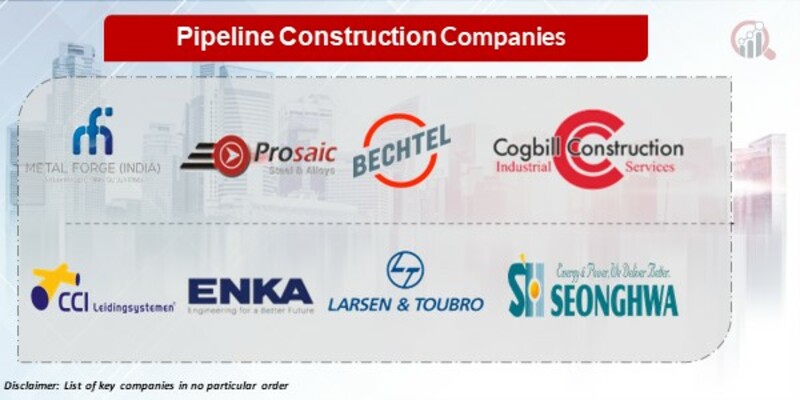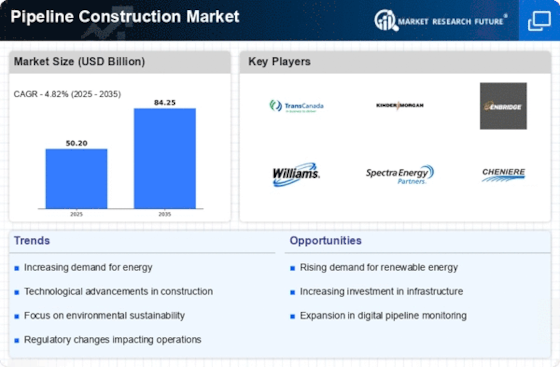Top Industry Leaders in the Pipeline Construction Market

The pipeline construction market is a labyrinth of competition where giants clash and nimble players weave through. Fueled by the ever-growing demand for energy, water, and other resources, this dynamic landscape is a fascinating tapestry of strategies, evolving trends, and fierce battles for market share. Let's delve into the intricate workings of this market, exploring the tactics employed, the factors influencing dominance, and the recent developments shaping its future.
Strategies Shaping the Pipeline Landscape:
-
Technological Prowess: Leading players like Bechtel and Saipem leverage cutting-edge technologies like horizontal directional drilling (HDD) and trenchless methods, minimizing environmental impact and maximizing efficiency. Drones, digital twins, and advanced data analytics are also making their mark, optimizing project planning and execution. -
Regional Specialization: Deep understanding of local regulations, terrain challenges, and cultural nuances is crucial. Companies like Larsen & Toubro and China Petroleum Pipeline Engineering Corporation (CPPEC) have built strong reputations for their expertise in specific regions, securing lucrative contracts. -
Consolidation and Partnerships: Mergers and acquisitions are reshaping the landscape, with established players like S&B Infrastructure Group and McAnally forging alliances to expand their reach and expertise. Strategic partnerships with technology providers and engineering firms are also driving innovation and market penetration. -
Sustainability Focus: The increasing focus on environmental responsibility is pushing companies towards greener pipeline construction methods. Think renewable energy pipelines, carbon capture and storage infrastructure, and the use of recycled materials in construction. -
Safety and Workforce Development: Ensuring worker safety and investing in skilled labor are paramount. Companies like TransCanada and Williams invest in training programs and safety initiatives, while others focus on attracting and retaining talent through competitive wages and benefits.
Factors Influencing Market Share:
-
Project Backlog and Government Spending: The availability of large-scale pipeline projects and government investments in infrastructure development significantly impact market share. Companies with strong track records and competitive bids stand to gain the most. -
Geographical Reach and Presence: A global footprint and established networks in resource-rich regions like the Middle East and Asia Pacific offer a distinct advantage in securing lucrative contracts. -
Cost Efficiency and Innovation: Companies that demonstrate cost-effectiveness through innovative techniques, material selection, and efficient project management stand out in a competitive market. -
Environmental and Social Impact: Demonstrating commitment to minimizing environmental damage and respecting local communities can be a crucial differentiator, attracting investors and securing social licenses to operate. -
Reputation and Track Record: A proven track record of successful project completion, safety adherence, and environmental responsibility builds trust and attracts clients, solidifying market share.
Key Players:
- Metal Forge India
- Prosaic Steel and Alloys
- Bechtel Corporation
- Cogbill Construction LLC
- CCI Leidingsystemen B.V
- Yena Engineering B.V.
- Enka Insaat Ve Sanayi
- Larsen & Turbo Limited
- Seonghwa Industrial Co Ltd
- Sung Il Sim Co. Ltd.
Recent Developments:
- In June 2023, Larsen & Toubro (L&T) has bagged a large offshore contract from ONGC for the seventh development phase of their pipeline replacement projects. This contract, awarded through international competitive bidding, reposes ONGC's confidence in L&T Hydrocarbon Engineering (LTHE) capabilities and commitment to support ONGC in the strategic oil and gas sector, and contribute to the country's energy security. The contract involves engineering, procurement, construction, installation and commissioning of 350 km subsea pipelines and related offshore works spread out across the country's west coast offshore fields of ONGC.
- In March 2022, Tellurian Inc. (Tellurian) announced that it has issued a limited notice to proceed to Bechtel Energy Inc. (Bechtel) under its executed Engineering, Procurement and Construction (EPC) contract to begin construction of phase one of the Driftwood LNG terminal, a liquefied natural gas (LNG) export facility near Lake Charles, Louisiana. Bechtel’s first activities include demolition, civil site preparation and construction of critical foundations, and Baker Hughes will progress manufacturing two of the natural gas turbines required for phase one of the project.
- Between 2014 and 2019, a joint venture of ENKA and Bechtel worked on the South Caucasus Pipeline Expansion (SCPX) Project, which was designed to increase the volume of gas flowing from the Shah Deniz field in the Azerbaijan sector of the Caspian Sea to Georgia and Türkiye. The project, including the construction of two compressor stations, a pressure reduction and metering station, and associated access roads, required over 24 million person-hours of work.










